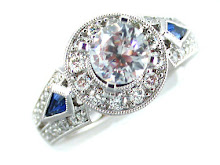 Gold is the #1 material for fine jewelry crafting. Its Latin name - aurum - means "shining dawn" and perfectly describes the metal. Gold is dense, soft, shiny and the most ductile pure metal known. Pure(24k) gold has a bright yellow color and attractive luster.
Gold is the #1 material for fine jewelry crafting. Its Latin name - aurum - means "shining dawn" and perfectly describes the metal. Gold is dense, soft, shiny and the most ductile pure metal known. Pure(24k) gold has a bright yellow color and attractive luster. Due to its softness pure 24k gold is not quite appropriate for stone settings, therefore, gold jewelry is made of a mixture of gold and other metals (such as sterling silver, copper, nickel and zinc; rarely iron and aluminium).
Due to its softness pure 24k gold is not quite appropriate for stone settings, therefore, gold jewelry is made of a mixture of gold and other metals (such as sterling silver, copper, nickel and zinc; rarely iron and aluminium).The "K" - karat number - tells us what fraction of 24 parts of the alloy are pure gold: for example, 14K is 14/24 or 58.33% of pure gold. Most typical alloys are 22k, 18k, 14k and 10k, hence 22k is the brightest one, 14k and 10k are somewhat lighter.
 Copper is the most commonly used base metal, yielding a redder color. 18k gold contains 25% copper is a traditional alloy for Russian style antique jewelry, it has distinct copper cast, creating rose gold.
Copper is the most commonly used base metal, yielding a redder color. 18k gold contains 25% copper is a traditional alloy for Russian style antique jewelry, it has distinct copper cast, creating rose gold.Blue gold can be made by alloying with iron and purple gold can be made by alloying with aluminium, although rarely done except in specialized jewelry.
 14k and 18k gold alloys with silver alone appear greenish-yellow and are referred to as green gold.
14k and 18k gold alloys with silver alone appear greenish-yellow and are referred to as green gold.White gold alloys are made with palladium or nickel: white 18k gold usually contains 17.3% nickel, 5.5% zinc and 2.2% copper is silver in appearance.
In Europe, gold is marked with a number indicating the gold parts content per thousand: 18K gold, which is 75% pure gold is stamped 750.
 Platinum is another rare metal perfect for filigree antique and modern ring styles. It is traditionally more expensive than gold, much stronger and requires highest temperatures to melt. It did not become a viable jewelry metal until advancements in jewelers' tools were made in the late 1800s and was also widely used and appreciated by watch-makers for not tarnishing neither wearing out.Jewelry platinum is usually an alloy of 90% platinum and 10% iridium. Platinum jewelry is stamped "Plat" or "Pt 900".
Platinum is another rare metal perfect for filigree antique and modern ring styles. It is traditionally more expensive than gold, much stronger and requires highest temperatures to melt. It did not become a viable jewelry metal until advancements in jewelers' tools were made in the late 1800s and was also widely used and appreciated by watch-makers for not tarnishing neither wearing out.Jewelry platinum is usually an alloy of 90% platinum and 10% iridium. Platinum jewelry is stamped "Plat" or "Pt 900". Vermeil is a combination of sterling silver and gold used in order to give silver jewelry "golden" look. A typical example is sterling silver base coated with 14k(58%) gold. To be considered vermeil, the gold must contain at least 42% of gold and be minimum 2.5 micrometers thick. The difference between 14k gold and 14k vermeil is slightly significant.
Vermeil is a combination of sterling silver and gold used in order to give silver jewelry "golden" look. A typical example is sterling silver base coated with 14k(58%) gold. To be considered vermeil, the gold must contain at least 42% of gold and be minimum 2.5 micrometers thick. The difference between 14k gold and 14k vermeil is slightly significant.


No comments:
Post a Comment